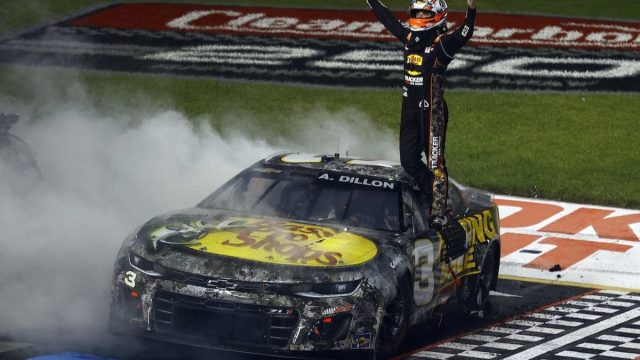Austin Dillon Ends 68-Race Losing Streak: Austin Dillon‘s recent success at the Cook Out 400 not only marked the end of an arduous 68-race losing streak but also reignited fervent discussions around ethics in racing. His victory, viewed by many as controversial due to his aggressive tactics, prompted sharp criticism from peers while Dillon himself remained unfazed, advocating for the entertainment value of the sport. This contrast of perspectives raises critical questions about the fine line between competition and sportsmanship in NASCAR.
Key Highlights
- Austin Dillon’s win at the Cook Out 400 marked the end of a 68-race losing streak, boosting his confidence and team morale.
- The victory was overshadowed by a controversial last-lap collision that raised questions about sportsmanship and aggressive racing tactics.
- Fellow drivers criticized Dillon for perceived unsportsmanlike conduct, highlighting the ethical dilemmas within NASCAR’s competitive environment.
- Despite backlash, Dillon expressed gratitude and emphasized resilience, prioritizing entertainment over the opinions of his competitors.
Controversial Finish at the Cook Out 400
The Cook Out 400 concluded with a highly controversial finish that not only sparked debate among fans and drivers but also marked a significant moment in Austin Dillon‘s racing career. With Denny Hamlin leading comfortably on his home turf, Dillon’s last-lap tactic—colliding with both Hamlin and Joey Logano—transformed an anticipated victory into a contentious spectacle. This aggressive approach, while raising eyebrows, was representative of Dillon’s desperation to clinch a much-needed win after a prolonged 68-race drought.
Dillon’s actions were tactically calculated, reflecting an understanding of the critical stakes involved. Trailing in the playoff standings, he recognized that the only way to alter his path was through bold, decisive action. By seizing the opportunity to push past Hamlin, Dillon not only secured a coveted victory at Richmond Raceway but also cemented his place in the upcoming playoffs. Critics may label this finish as unsportsmanlike, yet it highlights a fundamental aspect of NASCAR: the fine line between aggression and legality.
While some drivers voiced their frustrations post-race, Dillon maintained a calm demeanor, choosing not to engage in retaliatory behavior. This decision emphasizes a maturity that can serve him well moving forward. The Cook Out 400 will certainly be remembered as a significant moment in Dillon’s career, illustrating that in the world of NASCAR, the pursuit of victory often comes with its own set of moral complexities.
Austin Dillon Shows Sportsman Spirit
Despite the backlash from fellow competitors, Austin Dillon exemplified a commendable sportsman spirit by choosing to rise above the controversy, demonstrating a perspective that emphasizes gratitude and resilience in the face of criticism. Following his recent victory, Dillon displayed an ability to transcend the negative sentiments expressed by rivals, including Denny Hamlin, who voiced strong objections post-race.
Dillon’s response to the uproar was particularly gracious, reflecting a maturity that is often lacking in competitive environments. He articulated his feelings in a press conference, stating, “I am thankful for it. Sorry for the ones that probably don’t like it… I love you either way.” This sentiment reinforces the notion that true sportsmanship involves acknowledging both victories and the emotions of others, regardless of personal outcomes.
“I don’t know why the god puts me in certain situations to have crazy finishes, but I am thankful for it. Sorry for the ones that probably don’t like it.. (don’t)like me. I love you either way. It’s a part of our sport and I am thankful for the sport so that it entertains a lot of people.” – Dillon
In maneuvering the complexities of competitive racing, Dillon’s ability to maintain a respectful and appreciative outlook serves as an example for both peers and fans similarly. His approach exemplifies the essence of sportsmanship, where the spirit of the game prevails over individual grievances.
Reactions from Fellow Drivers
Reactions from fellow drivers to Austin Dillon’s controversial victory reveal a deep divide in the NASCAR community, with many expressing frustration and disappointment over what they perceive as unsportsmanlike conduct.
Prominent among the critics is Joey Logano, who labeled Dillon a “piece of crap” following the race, emphasizing the personal impact the incident had on him. Logano’s frustration was palpable, as he dropped to 19th place, a noticeable contrast to Dillon’s ascent into the playoff picture. His comments highlight a sentiment among drivers that aggressive tactics, particularly those resulting in collisions, undermine the integrity of the competition.
“He sucks. He’s sucked his whole career. Now he’s going to be in the playoffs. Good for him, I guess.” – Logano
Tyler Reddick and Bubba Wallace also voiced their discontent, describing Dillon’s actions as “over-aggressive” and “unfair.” This collective dissent signifies a broader concern regarding the balance between competitive drive and ethical racing practices. While Dillon celebrates a long-awaited victory, the reactions from his peers suggest that his approach might have lasting repercussions on his relationships within the paddock.
The dichotomy of opinions reflects an ongoing struggle in NASCAR: the tension between the desire for victory and the unwritten code of conduct that governs driver interactions. As Dillon prepares for the playoffs, the question looms large: will his peers continue to view him through the lens of this controversial win, or can he transcend the backlash and redefine his reputation in the sport?
Historical Context of NASCAR Incidents
Drawing on a rich history of high-stakes rivalries and controversial tactics, NASCAR has often found itself at the intersection of competitive aggression and ethical racing standards. The sport’s narrative is punctuated by incidents where drivers employ questionable methods to secure victory, creating a complex tapestry that blurs the lines between strategy and unsportsmanlike conduct.
The recent win by Austin Dillon reignites memories of similar moments etched in NASCAR’s history. For instance, in 2020, the clash between Joey Logano and Chase Elliott at Bristol Motor Speedway illustrated the lengths to which drivers will go when faced with high-pressure scenarios. Logano’s untimely wreck, instigated by Elliott, highlighted the ruthless nature of the sport where the spoils of victory often dictate the calculus of risk.
The subsequent silence from Elliott, encapsulated in his dismissal of Logano’s expectations for an apology, reflects a cultural norm within NASCAR that sometimes prioritizes victory over sportsmanship. Such incidents are not mere anomalies; they are representative of a broader ethos that permeates the NASCAR Cup Series.
As the stakes escalate, particularly in the lead-up to critical races, the propensity for controversial tactics increases. This cyclical pattern of criticism and justification among drivers and fans similarly is a reflection of NASCAR’s enduring allure and the intricate dynamics that govern its competitive landscape.
Recent NASCAR Penalties
The ongoing discourse surrounding NASCAR’s competitive landscape is further complicated by the recent imposition of penalties, a reflection of the sport’s commitment to maintaining integrity amidst heightened tensions on the track. This year, two notable incidents have drawn scrutiny and served as a reminder of NASCAR’s zero-tolerance stance on reckless behavior during races.
The initial incident involved Carson Hocevar of Spire Motorsports, who collided with Harrison Burton’s car under caution at the Nashville Superspeedway. This reckless act resulted in a considerable penalty, as NASCAR levied a $50,000 fine against Hocevar and deducted 25 points from his standing. Such penalties are not simply punitive; they serve as a deterrent against actions that compromise the safety and competitive spirit of the sport.
Additionally, Austin Hill faced similar repercussions in the Xfinity division for wrecking Cole Custer, receiving a $25,000 fine and a reduction of 25 regular season points. These penalties highlight NASCAR’s intent to enforce discipline and guarantee that drivers adhere to a code of conduct that prioritizes fair competition.
Through these actions, NASCAR seeks to preserve the integrity of racing while emphasizing accountability. The penalties not only impact the drivers involved but also send a broader message to the entire NASCAR community about the importance of sportsmanship and respect on the track.

News in Brief: Austin Dillon Ends 68-Race Losing Streak
The conclusion of Austin Dillon’s 68-race losing streak at the Cook Out 400 highlights the complexities of competition within NASCAR, particularly regarding the intersections of aggressive racing tactics and sportsmanship.
While Dillon’s victory reignites discussions about ethical racing practices, the reactions from fellow drivers reveal a divided sentiment on the appropriateness of such tactics.
Ultimately, this incident serves as a microcosm of the broader challenges facing the NASCAR community in balancing competitive spirit with principles of fair play.
ALSO READ: Austin Dillon’s Race Penalty: NASCAR Insiders Weigh In on Possible Outcomes


